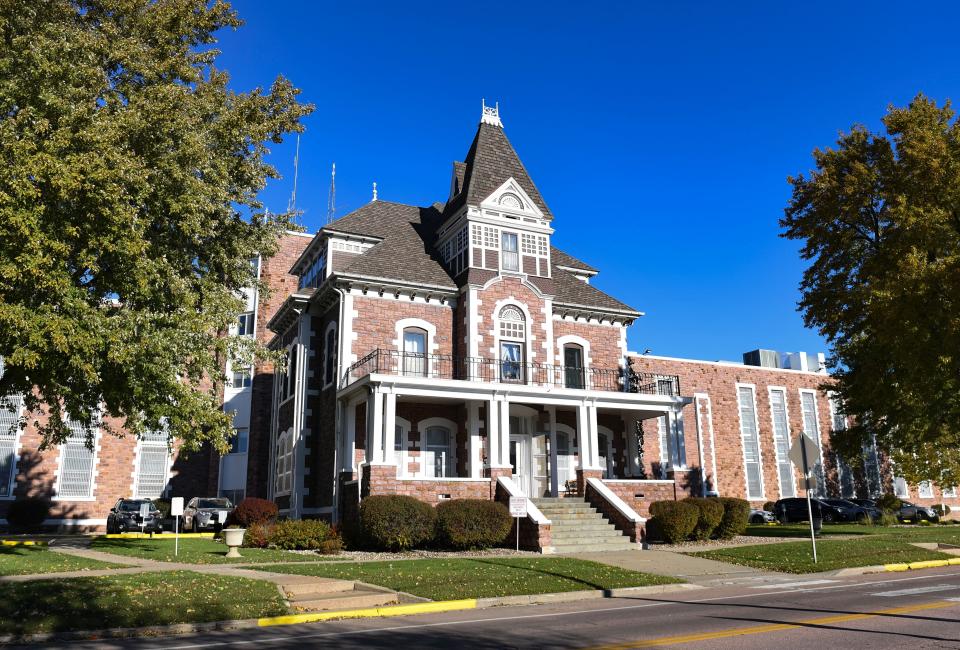South Dakota lawmakers want to tighten how the state handles parole eligibility
PIERRE — A new bill, called "Truth in Sentencing," would require people convicted of serious violent crimes to serve either all or a majority of their sentence before being eligible for supervised release or parole, a step toward a tougher stance on who gets released from prison.
Those in favor of the two-part bill, like the South Dakota Attorney General, the Minnehaha County State's Attorney and Sioux Falls Police Department chief, argued that South Dakota cities are facing a wave of violent crime being committed by people who have violent criminal records,
Meanwhile, opponents worried it could lead to increased prison populations in a state where the prisons are already overcrowded, and de-incentivize programing like addiction treatment.
Freshman Sen. Brent Hoffman, R-Sioux Falls, brought the bill after having conversation with law enforcement, various state's attorneys and others involved in the criminal justice system. He called it a landmark law and order bill while explaining its various sections.
More:Data shows Native Americans in South Dakota receive longer manslaughter sentences
"It is not a cure-all for every crime that ails us, but I think it is an important first step to address the violent crime in particular that so ravages our community, affects our citizens, and for which they want us to do something about," Hoffman said.
Currently, inmates can gather sentencing credits, from either their time served in jail before they had their trial or by attending programming. These credits can then be applied for a shortened sentence, making the person parole eligible. The bill would change parts of this programming, depending on the person's crime.
In the first section of the bill, anyone convicted of one of 13 high level violent crimes, such as first-degree manslaughter and first-degree human trafficking, would have to serve the full sentence imposed on them by a judge without credits for a shortened term. The inmate would then be eligible for supervised release.
In the second section, those convicted of one of 10 other violent crimes, such as aggravated assault or second-degree manslaughter, they could receive credits that could be applied toward shortening their sentence. However, they must serve at least 85% of their sentence before becoming parole eligible.

Attorney General Marty Jackley said in the federal detention system, the feds had done away with parole years ago, because of a lack of resources within the parole system.
"We have good people that are in the parole system," he said. "They just don't have enough resources. They're trying to supervise too many people."
Cities like Sioux Falls are seeing a majority of violent crimes be committed by those already involved in the criminal justice system.
Jon Thum, the Sioux Falls chief, said his department had more than 60 aggravated assaults reported in July 2022, and "the vast majority had some history of assaultive behavior or involvement with the criminal justice system at a variety of ways."
More:What we learned from the city of Sioux Falls public safety update
But, opponents were wary of what they considered a massive overhaul of South Dakota's sentencing system. They worried by refusing sentencing credits for the inmates in section one of the proposed bill, those inmates would be discouraged to participate in prison programming or participate in good behavior.
Justin Bell, a lobbyist for the South Dakota Association of Criminal Defense Lawyers, said in other states where sentencing laws like the one proposed Tuesday were passed, prison populations went up.
"The prison system quite frankly, right now, does not have capacity to take the amount of additional [people]," Bell said.
The women's prison in Pierre is currently at 156% of its design capacity, while the South Dakota State Penitentiary in Sioux Falls is at 160% of its design capacity, according to the Department of Corrections.
More:South Dakota gets closer to defining 'consent,' creating new rape penalty
Lawmakers are currently mulling funding to build a $60 million new women's prison in Rapid City and purchasing land for a multi-million dollar new men's prison in Sioux Falls.
Samantha Chapman, the ACLU of South Dakota advocacy manager, argued parole encouraged prisons to host rehabilitative programs for inmates.
"We have to believe that people can change for good," she said. "By eliminating the possibility of parole for whole swaths of incarcerated people, we are kneecapping their motivation for self evaluation and genuine desire for change."
Sen. David Wheeler, R-Huron, gave the lone no vote against the bill. He said he felt the bill would make people feel good about offenders' sentences, but would not do much to address the true problems within the criminal justice system.
"The problem is we don't have enough programming in our prisons," Wheeler said. "The problem is our correctional system. It's not the parole system."
This article originally appeared on Sioux Falls Argus Leader: SD wants to tighten how the state handles sentencing violent crimes

